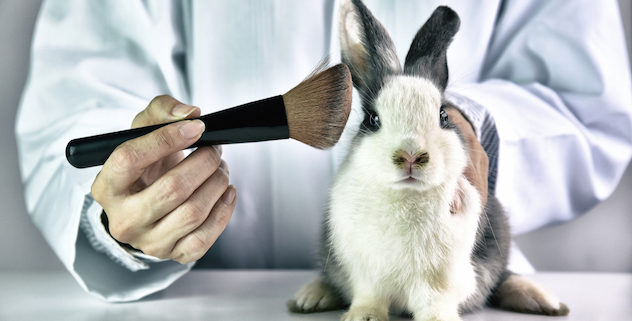News
New law targets cosmetics testing on animals
 Testing cosmetics on a laboratory rabbit. (Photo: Artfully Photographer, via Shutterstock)
Testing cosmetics on a laboratory rabbit. (Photo: Artfully Photographer, via Shutterstock)Animal-rights activists are heralding 2020 as a groundbreaking year because of a new, unprecedented state law that cracks down on cosmetics testing on animals.
Gov. Gavin Newsom signed the legislation, SB 1249 by Sen. Cathleen Galgiani, D-Stockton, in September. It takes effect Jan. 1, and will outlaw the importation for profit or sale most of the cosmetics tested on animals in California.
The prohibition also applies to any ingredients or components used in the cosmetics.
“There’s some things that kind of overlap between cosmetics and over-the-counter drugs.” — Nick Sackett
Companies who continue to use cosmetics that have been tested on animals will face a $5,000 fine with a $1,000 fine for each additional day they continue to violate the new law.
There are several major exemptions to the law, however.
It is already illegal to conduct animal testing in California when an alternative method is available, unless the test is required by state or federal agencies like the U.S. Food and Drug Administration. This same exception applies to Sen. Galgiani’s legislation.
Nick Sackett, legislative director for Social Compassion in Legislation – a co-sponsor of her bill — says that the federal government rarely requires animal testing in the case of cosmetics.
“There’s some things that kind of overlap between cosmetics and over-the-counter drugs,” such as sunscreen, he said. In cases like this the U.S. Food and Drug Administration is required to oversee production.
Another exemption is made for ingredients that are “in wide use and cannot be replaced by another ingredient capable of performing a similar function,” according to the Senate analysis. Mr. Sackett says that in order to be eligible for this exemption, the ingredient needs to be determined to be in wide use and irreplaceable by a government agency.
Yet another exemption is made for animal tests that are required by foreign regulatory agencies.
Opponents argued that China requires animal testing of cosmetics and that outlawing them in California would force the industry to leave the state. The exception for foreign agencies was initially intended to sunset in 2023, but this argument persuaded lawmakers to remove the sunset period from the bill.
The foreign-required animal tests are only permitted if the information gleaned from the test is not “relied upon to substantiate the safety of the cosmetic,” according the language in the bill.
Sackett says cosmetics companies will still have to conduct non-animal tests to prove their products’ safety to the state of California before they can be sold. Since manufacturers cannot save money by only conducting the foreign required tests, the law “doesn’t incentivize the company to rely on foreign governments.”
By requiring the cosmetic manufacturers to conduct non-animal tests for sale in California in addition to the animal-tests required by governments like China’s, the new law encourages a company to use non-animal testing in in areas where it can.
Cosmetics and their ingredients that have been tested on animals before Jan. 1, 2020, will not be subject to the ban either.
Similar laws exist in the European Union, and other states have followed California’s lead, according to Judie Mancuso, founder and president of Social Compassion in Legislation, although she described California’s law as “tighter.”
The provisions of SB 1249 “will be the strongest law in the United States,” according to David Quintana, a lobbyist for the law’s supporters, who spoke earlier with Capitol Weekly.
—
Ed’s Note: Corrects final paragraph to reflect lobbyist representing law’s supporters, not opponents. Bryndon Madison is a Capitol weekly intern from UC Santa Barbara.
Want to see more stories like this? Sign up for The Roundup, the free daily newsletter about California politics from the editors of Capitol Weekly. Stay up to date on the news you need to know.
Sign up below, then look for a confirmation email in your inbox.

Leave a Reply